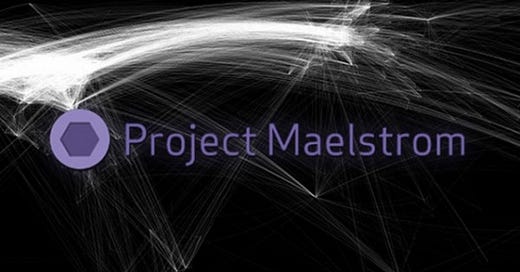Project Maelstrom, Ultron & Skynet
Click to read the full story: Project Maelstrom, Ultron & Skynet

The internet can take on a whole new shape when Bittorrent’s Project Maelstrom becomes reality. Websites won’t be hosted in one or several mirrors, instead, they’ll be hosted by thousands of computers. Websites will be indestructible, no longer prone to denial-of-service attacks, financial problems or server breakdown. Like the Avenger’s enemy Ultron, websites become as indestructible or perpetual as long as bits of it survive somewhere in the internet. That is the aim of Bittorrent’s Project Maelstrom, to speed up website access and make them immortal. Bittorent’s aims also include keeping the internet open, free and neutral, along the lines of ‘letting the people own the internet.’
Everyone should be familiar by now of the concept of file-sharing via torrents. Files, especially large ones are shared in bits and pieces making them faster to download. These bits and pieces are shared and stored on the computers of everyone downloading or has already downloaded them and these pieces get transmitted at the same time. As long as someone seeds, the file will be available. The more seeds a file has, the faster it gets downloaded. So what if websites were treated the same way?

If websites were treated the same way, they will be able to perform faster being hosted on multiple computers, not just on one or two servers. The more popular a website, the faster it gets. Websites virtually become crowd-funded. Websites could become immune to distributed denial-of-service attacks because there’s not one host to attack. Websites won’t go down because of sudden request surges, in fact they’ll perform faster with more and more access. Bandwidth cap hosting could also become obsolete or websites won’t be locked because a certain amount of bandwidth assigned to it has been reached. Websites won’t be taken down if the owner runs out of funding or if their servers crash.
The downside for websites that enter this type of hosting is that new and unpopular websites will load very slowly if not hosted on an already powerful computer. In this system, the creator becomes the first seed and must ensure his website gets off the ground as quickly as possible. Owners will have to resort to advertising and social media to get off the ground which is basically the same as the old fashioned way. The more people access the site at the same time, the more seeds there will be. One good thing is that website owners can do away with their hosting subscriptions when their website gets off the ground.
Another downside is that illegal websites become hard to take down so long as there are people who support them, no matter where they are. Sites considered illegal such as The Pirate Bay will remain open and won’t even require any servers for authorities to raid. On the other side, sites advocating free speech, the spread of ideologies considered illegal in countries that host them will remain open even after their servers are raided which is in keeping with Bittorrent’s aim of maintaining internet freedom.
As previously mentioned, when a website becomes popular, it gains plenty of seeds, takes on a life of its own and will no longer require its dedicated server. This enables website owners to cut costs of maintaining or even upgrading their servers. Popular content-providing websites such as Hulu or Netflix or even Xbox and PlayStation Network can benefit through Project Maelstrom. These websites can cut costs big time by streaming themselves the old fashioned way only through computers that use traditional access methods and letting the internet do the rest for Maelstrom users. They would no longer need to expand on their hardware as much as they should in traditional internet. Wikipedia and Project Gutenberg for instance will no longer need to ask for donations. DDOS which continue to plague or threaten them will be a thing of the past or rather the DDOS effect would be put in reverse speeding up websites rather than shutting them down.
To put it simply, Project Maelstrom will be done via web browser (similar to Google Chrome) and later specialized apps or clients. Like cookies, parts of websites will be stored on the users’ computer and seeded. The more people access a particular website, at the same time, the faster it gets.
Technically, it’s a good idea born out of good intentions such as the quest for good performance and freedom. Low costs, free speech and all that. Anyone will be able to host a website without monthly hosting and server costs. Positive advocacy, educational sites and even charity institutions can continue to operate with minimal funding.
However, in the comics, Ultron and even Skynet of the Terminator franchise, were made by their creators with good intentions only to turn on them. They became practically immortal as long as they have copies of themselves stashed safely somewhere. Criminals could take advantage of this and create websites that will be impossible to take down. Everything considered illegal on the internet such as piracy sites, hate groups and child porn, could become perpetually present long after their creators are prosecuted. There’s always two sides of the coin but hopefully, Project Maelstrom could turn into a trick coin where it’s always heads up.
The post Project Maelstrom, Ultron & Skynet appeared first on Movie TV Tech Geeks News By: Marius Manuella


